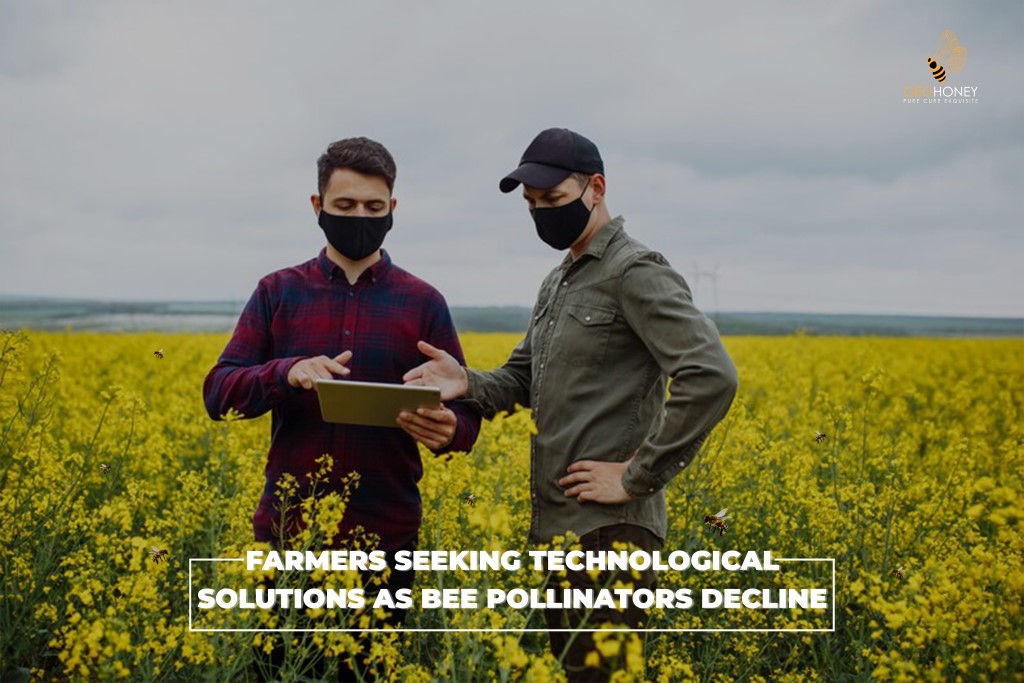- Tokyo: 12:11
- Singapore: 11:11
- Dubai: 07:11
- London: 03:11
- New York: 22:11
Farmers Looking for Technological Options as Bee Pollinators Diminish

Farmers are turning to technology-driven solutions as diminishing bee populations pose pollination issues.
Mr. Sade created BloomX, a technology startup, on a moshav, or collective farm in central Israel. He claims that the company has discovered a method for mechanically pollinating crops, similar to how bees do it.
Three-quarters of all crops grown for human use, especially those bearing fruits or seeds, rely on pollinators to some extent. Honeybees cultivated for farming and over 20,000 different wild bee species, including bumblebees, are important pollinators.
The Significance of Insects to Life on Earth
Insects are critical to the survival of life on Earth. Bees alone produce 75% of the pollination required for fruits, nuts, and vegetables in the United States. Wasps and butterflies account for the remaining 25% throughout Europe.
Unfortunately, bee populations are facing serious challenges. Climate change, loss of natural habitats, and pesticide use all put strain on them. Furthermore, European honeybees are particularly vulnerable to the parasite varroa destructor.
BloomX's technique is focused on two crops: blueberries and avocados. This method provides pollination even when local bees are scarce.
"Robee," their main product, resembles a giant push-along lawn mower. It has two mechanical arms that extend on either side. When these arms are moved over blueberry plants, they cause pollen to be released. The vibration level has been carefully tuned to simulate the wing activity of bumble bees, who are the most effective pollinators of blueberries, stimulating the blossoms during pollination.
BloomX also sells "Crossbee," a mobile gadget designed for collecting and disbursing sticky pollen grains among avocado plants. This equipment is used in many different parts of the world, including South America, South Africa, Spain, the United States, and Israel. BloomX claims that it can enhance fruit harvests by up to 30%.
These products are controlled by AI-powered software that is linked to a mobile phone app. Furthermore, each gadget includes GPS technology, allowing agricultural workers to trace the parts of a field that have been treated.
Sensors can also be used to guarantee that pollination occurs on the most favourable days.
Almond Pollination Challenges for Honeybees
California dominates the almond industry, producing 80% of the world's almonds and generating an estimated $10.4 billion in annual revenue. During the almond flowering season, honeybees are transported from all over the United States to pollinate the state's massive 1.3 million acres of almond trees.
According to some reports, up to 70% of commercial honeybee populations in the United States are transferred to California for this purpose.
This honey bee migration may result in pollination shortages for other crops in other sections of the country. Artificial pollination may provide a remedy to the pollination gap.
"Travel can stress honey bees and weaken colonies, but the business of pollinating almonds is hugely important for beekeeper income and keeping their operations economically viable."
"However, the impact on other crops is that honey bees may be in short supply if other crops have bloomed at a time that coincides with the California almond industry." According to Lisa Wasko DeVetter, associate professor of horticulture at Washington State University.
The almond fields suffer a number of obstacles, including a high rate of honeybee death due to pesticide exposure and the stress of long-distance transit. Furthermore, this reliance on honeybees can endanger local wild bees by forcing them to compete for food and confront new diseases.
Technology for Artificial Pollination
Some argue that artificial pollination should be used in almond agriculture. According to Eylam Ran, CEO of the Israeli software business Edete, relying only on bees may place them in unfavourable situations.
Edete's technique focuses on pollen preservation, with the ability to store it for years without deterioration. They've created machinery for efficiently collecting and applying pollen.
Edete's technology has mostly been used in pistachio farms in California, but they are now expanding their efforts to include almond farming.
Source: openaccessgovernment.org




Whether we like it or not, bees are very essential in every way, we are just oblivious to their importance.